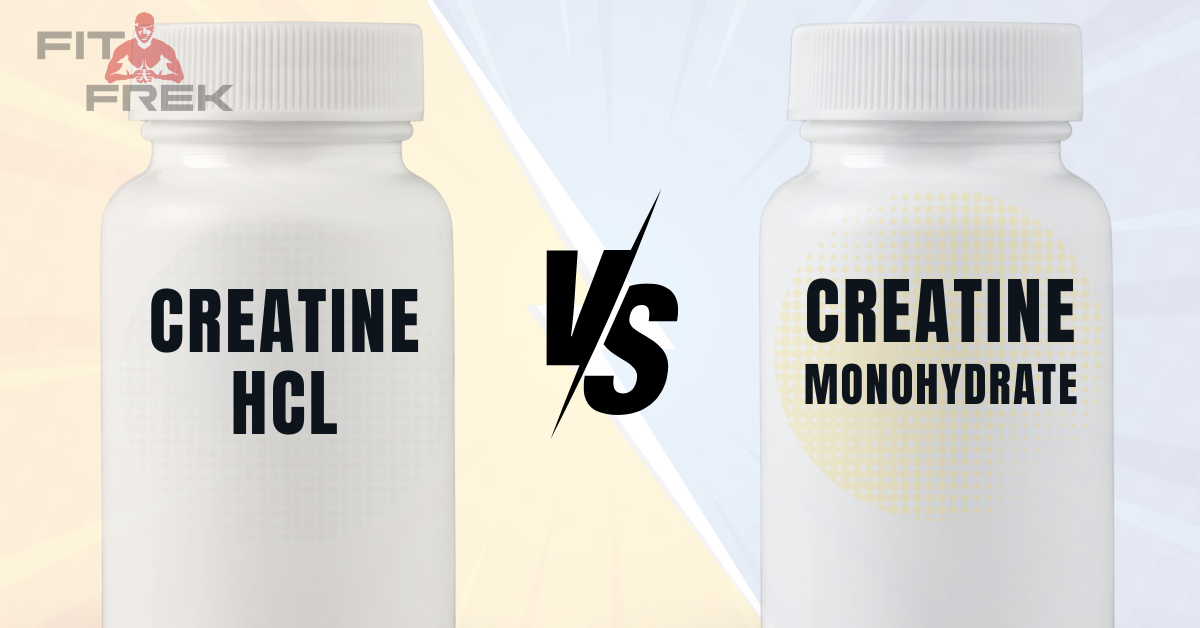
Creatine is a popular supplement among gym-goers, known for its muscle-building benefits.
It aids in short energy bursts and allows the muscles to recover post-workout efficiently.
Two popular forms of creatine are Creatine Hydrochloride (HCL) and Creatine Monohydrate.
But what's the difference between these two types
Which one is better for your goals?
Let's dive into the details.
Creatine HCL and Creatine Monohydrate are both forms of creatine, an amino acid that supports muscle strength, short energy bursts, muscle recovery, and improvements in body composition.
However, they differ in their molecular structure and how the body absorbs and utilizes them.

Many companies produce both Creatine HCL and Creatine Monohydrate supplements.
One such company is Gainful, which offers a Creatine Performance Boost, a creatine monohydrate.
The product is recommended for both bodybuilders and endurance athletes.
Creatine HCL is made up of a creatine molecule with hydrochloride attached.
Hydrochloride significantly enhances water solubility and absorption.
Because of its greater solubility, you can take a smaller dose of Creatine HCL than you would with Creatine Monohydrate to see the same results: muscle growth, strength gains, and lean mass gains.
The attached HCL makes the creatine molecule more stable, meaning a loading phase isn’t as crucial.
See: Best Creatine HCl Supplements
Creatine Monohydrate is typically made with a creatine molecule and a water molecule.
This combination brings more water into the muscle, allowing it to increase in size quickly.
Creatine Monohydrate works best when a person incorporates a loading phase into their routine.
This involves taking 20–25 grams of Creatine Monohydrate daily, split into 4–5 equal doses for 5–7 days.
The purpose of loading is to saturate your muscle cells with creatine quicker so that you can experience its benefits sooner.
Both Creatine HCL and Creatine Monohydrate offer benefits for gym-goers and athletes.
Creatine HCL works faster and requires smaller doses for big results, while Creatine Monohydrate is beneficial for many different fitness goals and has been extensively studied for much longer.
Creatine enhances energy production in your cells.
The most basic form of cell energy is adenosine triphosphate (ATP).
ATP depletes quickly during exercise, but creatine helps replenish ATP.
The more creatine you have for your body to use, the more energy your muscle cells have for exercise and recovery after your workout.
Research shows that creatine supplementation is beneficial for many different fitness goals.

Creatine monohydrate is a popular supplement among athletes aiming to enhance their sports performance.
It's not just used as a performance booster, but also as a training aid to intensify resistance training workouts.
When combined with resistance training, creatine supplementation has significantly increased muscle strength and weightlifting performance.
In a review of 22 studies, the average increase in muscle strength following creatine supplementation plus resistance training was 8% greater than the average increase following placebo ingestion during resistance training.
Similarly, the average increase in weightlifting performance following creatine supplementation plus resistance training was 14% greater than the average increase following placebo ingestion during resistance training.
The improvement in bench press 1RM (one repetition maximum) ranged from 3 to 45%, and in weightlifting performance in the bench press ranged from 16 to 43%.
This indicates that creatine supplementation during resistance training is more effective at increasing muscle strength and weightlifting performance than resistance training alone, although the response is highly variable.
Creatine HCL (hydrochloride) is a form of creatine bound with hydrochloride to increase its solubility and absorption in the body.
This means less creatine HCL is needed to achieve the same effects as creatine monohydrate.
In a study comparing the effects of creatine monohydrate and creatine HCL, both forms of creatine significantly increased strength and muscle mass in resistance-trained men.
However, creatine HCL was found to be more effective at increasing total body mass and fat-free mass and improving vertical jump performance.
In another study, creatine HCL was more effective than creatine monohydrate at improving muscle endurance and anaerobic power in college-aged men.
These studies suggest that creatine HCL may be a more effective form of creatine for improving strength, muscle mass, and athletic performance.
However, more research is needed to confirm these findings and to determine the optimal dosage of creatine HCL.
The main difference between Creatine HCL and Creatine Monohydrate is their solubility and absorption.
Creatine HCL is more soluble, meaning it can be absorbed more quickly and efficiently by the body.
This allows for smaller doses to be taken compared to Creatine Monohydrate.
Based on the current scientific evidence, Creatine Monohydrate is proven to improve strength and performance.
While Creatine HCl is claimed to have certain advantages over Creatine Monohydrate, such as better solubility and bioavailability, these claims are not yet fully substantiated by scientific evidence.
Recommended: Best Pre-Workouts with Creatine
Creatine Monohydrate has been extensively studied for much longer.
While taking microdoses or relatively few grams of Creatine HCL is widely considered safe, it hasn’t been studied as thoroughly as Creatine Monohydrate.
Research shows that Creatine Monohydrate supplementation is beneficial for many different fitness goals.
Both Creatine HCL and Creatine Monohydrate can improve strength and performance.
However, because Creatine HCL is more soluble, it may be absorbed more quickly and efficiently by the body, potentially leading to faster results.
What is Creatine Monohydrate?
Creatine Monohydrate is a form of creatine, a molecule that naturally occurs in the body and plays a crucial role in energy production in muscle cells. It is a creatine molecule bound to a molecule of water.
What is Creatine HCl?
Creatine HCl is a form of creatine that is a creatine molecule bound to a molecule of hydrochloric acid. It is more soluble in water and more bioavailable than Creatine Monohydrate.
What are the benefits of Creatine Monohydrate?
Creatine Monohydrate can enhance muscle growth and athletic performance by increasing the body's stores of creatine phosphate, a molecule that helps to regenerate ATP, the body's main source of energy.
What are the benefits of Creatine HCl?
Creatine HCl is claimed to have certain advantages over Creatine Monohydrate, such as better solubility and bioavailability. However, the scientific evidence to support these claims is still limited.
Which form of creatine is better?
Based on the current scientific evidence, Creatine Monohydrate is the better choice. It has been extensively studied and proven to be effective, while the scientific evidence supporting the effectiveness of Creatine HCl is still limited.
Can I take both Creatine Monohydrate and Creatine HCl?
It is generally not necessary to take both forms of creatine. Both forms serve the same purpose: to increase the body's stores of creatine phosphate.
Both Creatine HCL and Creatine Monohydrate offer benefits for gym-goers and athletes.
The choice between the two will depend on your individual goals, preferences, and how your body responds to each supplement.
It's always best to consult a healthcare professional before starting any new supplement regimen.
Useful Links
 About FitFrek
About FitFrekFitFrek operates as an independent platform, offering comprehensive workouts, programs, routines, guides, and unbiased reviews to accelerate your progress. We pride ourselves on our honesty, delivering straightforward and candid insights. FitFrek does not offer medical advice, diagnosis, or treatment services.